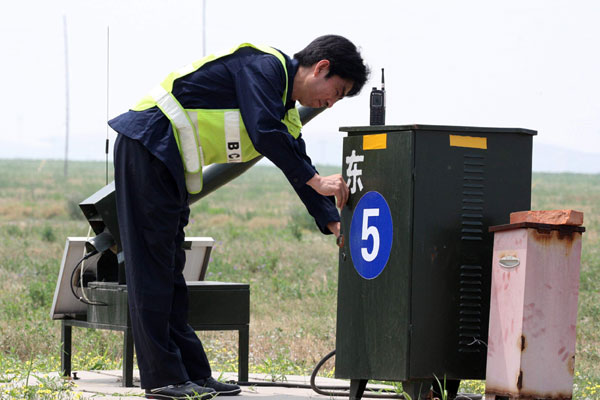

"But all the methods were useless," Sui recalls.
"In the end, the airport was forced to stop operations, until the birds flew away themselves."
Although no accident happened, the event was a wake-up call for BCIA, prompting it to establish a bird dispersal patrol team. Sui was appointed to lead the team of four.
"I love birds, but since then, I view every bird as a threat," Sui says.
Initially, the team had only one car and several guns but they were soon equipped with imported devices, such as gas exploders and bird repellers.
Unfortunately, in September 1998, history repeated itself. Hundreds of thousands of swallows descended upon the airport again. Even with the help of paramilitary police, they couldn't eliminate the swallows. The airport was once again shut for several hours.
 |
|
Sui inspects bird dispersal equipment. Photo by Jiang Dong / China Daily |
"We realized that relying on the scaring system was too passive," Sui says.
Sui went on a research spree, and made defeating birds his life mission.
"Birds are smart. They learn to ignore those alien sounds and objects once they find them harmless," Sui says.
"I changed the ideology of dealing with the birds - to be proactive instead of reactive."
Instead of killing or scaring birds away, Sui tried to understand why they came and how to keep them away.
Research on the airport's surroundings reveals that the environment provides a conducive habitat for birds.
The green area around the airport breeds insects and supplies seeds, which attract small birds and in turn, these are prey for bigger birds.
The BCIA is also located along the routes of migratory birds, such as swallows and gulls.
"Following the ecological chain was like discovering the missing pieces of a puzzle," Sui says.
Today, the core responsibility of Sui's team is to control rather than to scare away birds.
Sui says since 1999, they have been mowing the grass and using pesticides to control the growth of grass, keeping the height to less than 20 cm so that rats and other pests won't breed. The team also constantly destroys birds' nests in the nearby forests.
"In this way, the total number of birds can be reduced significantly," Sui says.
In recent years, BCIA has only encountered a few small birds on the runways, but there has been no major bird strike.
"It is impossible to be totally bird-free, but we are doing our best," Sui says.